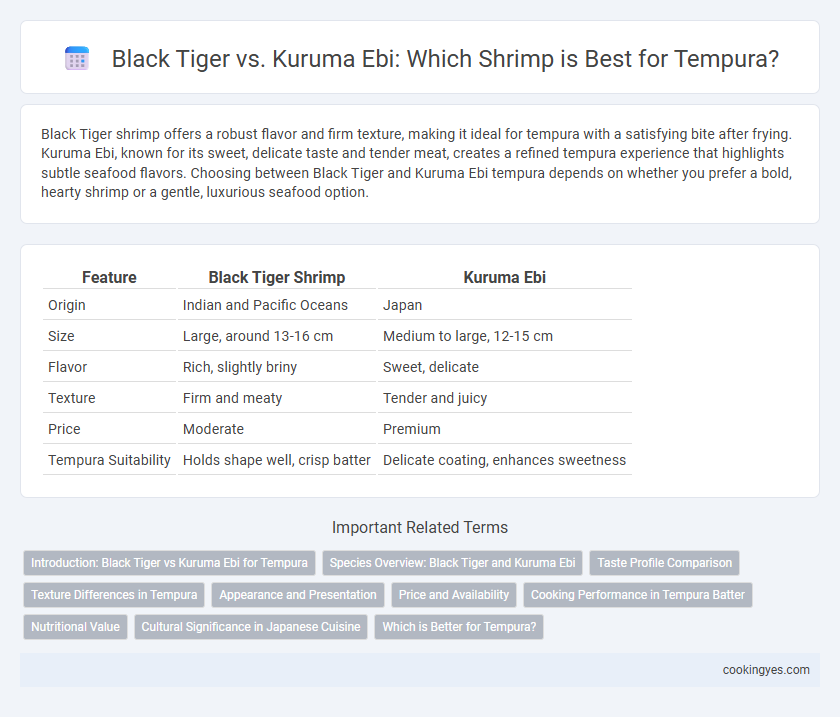Black Tiger shrimp offers a robust flavor and firm texture, making it ideal for tempura with a satisfying bite after frying. Kuruma Ebi, known for its sweet, delicate taste and tender meat, creates a refined tempura experience that highlights subtle seafood flavors. Choosing between Black Tiger and Kuruma Ebi tempura depends on whether you prefer a bold, hearty shrimp or a gentle, luxurious seafood option.
Table of Comparison
| Feature | Black Tiger Shrimp | Kuruma Ebi |
|---|---|---|
| Origin | Indian and Pacific Oceans | Japan |
| Size | Large, around 13-16 cm | Medium to large, 12-15 cm |
| Flavor | Rich, slightly briny | Sweet, delicate |
| Texture | Firm and meaty | Tender and juicy |
| Price | Moderate | Premium |
| Tempura Suitability | Holds shape well, crisp batter | Delicate coating, enhances sweetness |
Introduction: Black Tiger vs Kuruma Ebi for Tempura
Black Tiger shrimp and Kuruma ebi are two popular choices for tempura, each offering unique flavors and textures. Black Tiger shrimp has a firm, slightly sweet flesh with a robust flavor, making it ideal for crispy tempura batter. Kuruma ebi, known as Japanese tiger prawn, provides a tender, juicy bite with a delicate sweetness, prized in traditional tempura dishes for its premium quality and refined taste.
Species Overview: Black Tiger and Kuruma Ebi
Black Tiger shrimp (Penaeus monodon) and Kuruma ebi (Marsupenaeus japonicus) are two popular species used in tempura, prized for their distinct textures and flavors. Black Tiger shrimp are larger with a firm, slightly sweet flesh ideal for a crispy tempura batter, while Kuruma ebi offers a delicate, tender bite with a subtle sweetness that enhances the tempura experience. Both species thrive in different environments, with Black Tiger shrimp primarily farmed in tropical waters and Kuruma ebi native to Japanese coastal regions, influencing their unique culinary profiles.
Taste Profile Comparison
Black Tiger shrimp offers a robust, slightly sweet flavor with a firm texture that holds well during frying, resulting in a crispy yet juicy tempura bite. Kuruma ebi, prized for its delicate sweetness and tender, buttery meat, delivers a more refined and subtle taste that pairs elegantly with light tempura batter. Both varieties enhance tempura uniquely, with Black Tiger emphasizing boldness and Kuruma ebi highlighting a smoother, more luxurious flavor profile.
Texture Differences in Tempura
Black Tiger shrimp offers a firmer, meatier texture in tempura, providing a satisfying bite that holds up well during frying. Kuruma Ebi, known for its tender and slightly sweet flesh, delivers a more delicate and succulent texture, creating a light and airy tempura experience. The choice between the two influences the tempura's mouthfeel, with Black Tiger emphasizing robustness and Kuruma Ebi highlighting softness.
Appearance and Presentation
Black Tiger shrimp Tempura features a striking contrast between the dark, purplish-black shell and the golden, crispy batter, offering a visually bold presentation that draws attention to its robust texture. Kuruma Ebi, known for its elegant, pale pink shell and longer, slender body, creates a refined and delicate appearance with its uniformly light, airy batter coating. The vibrant colors of Black Tiger emphasize its hearty appeal, while Kuruma Ebi's sleek form and subtle hue enhance the dish's sophisticated and traditional Tempura presentation.
Price and Availability
Black Tiger shrimp are more affordable and widely accessible, making them a popular choice for tempura dishes in many regions. Kuruma ebi, prized for its sweeter flavor and firmer texture, commands a higher price and is less commonly found outside specialty markets. Availability of Kuruma ebi is often limited by seasonal and regional factors, increasing its exclusivity compared to the more readily sourced Black Tiger shrimp.
Cooking Performance in Tempura Batter
Black Tiger shrimp offers a firmer texture and slightly sweeter flavor that holds up well in tempura batter, resulting in a crisp, golden crust with minimal oil absorption. Kuruma Ebi, known for its tender, juicy meat, creates a delicate tempura with a lighter bite but may absorb more oil due to its higher moisture content. The choice between Black Tiger and Kuruma Ebi in tempura depends on desired texture and cooking performance, with Black Tiger providing a sturdier fried experience and Kuruma Ebi delivering a softer, more succulent finish.
Nutritional Value
Black Tiger shrimp boast higher protein levels and lower fat content compared to Kuruma Ebi, offering a leaner choice for tempura dishes. Kuruma Ebi contains more essential minerals like calcium and zinc, contributing to bone health and immune support. Both varieties provide beneficial omega-3 fatty acids, but Kuruma Ebi typically has a richer nutrient density overall.
Cultural Significance in Japanese Cuisine
Black Tiger and Kuruma Ebi hold distinct cultural significance in Japanese tempura, with Kuruma Ebi often revered for its premium status in traditional Japanese dining due to its sweet, delicate flavor and association with celebratory meals. Black Tiger shrimp, valued for its affordability and robust texture, is widely used in everyday tempura, reflecting modern adaptations and accessibility in Japanese cuisine. The choice between these shrimps highlights the balance between preserving cultural heritage and embracing contemporary culinary trends in tempura preparation.
Which is Better for Tempura?
Black Tiger shrimp offers a firm texture and a slightly sweet flavor, making it ideal for tempura due to its ability to hold up well during frying. Kuruma Ebi, prized for its rich, buttery taste and tender meat, provides a luxurious tempura experience but can be more delicate. For tempura, Black Tiger is better suited for those seeking a crispy, resilient bite, while Kuruma Ebi caters to diners preferring a succulent, premium shrimp option.
Black Tiger vs Kuruma Ebi for Tempura Infographic

 cookingyes.com
cookingyes.com